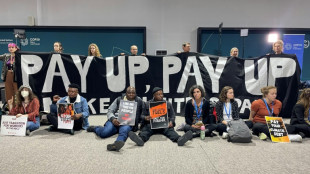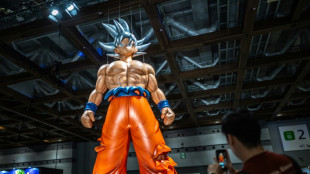
-
 Uganda opposition figure Besigye appears in military court
Uganda opposition figure Besigye appears in military court
-
General strike in Greece against cost of living

-
 UN nuclear chief welcomes Iran's 'concrete step' on uranium stockpile
UN nuclear chief welcomes Iran's 'concrete step' on uranium stockpile
-
Floods to shave 0.2 percentage points off Spain's growth

-
 Argentina's Contepomi makes one change for France Test
Argentina's Contepomi makes one change for France Test
-
'Steep climb' ahead as clock ticks on stalled climate talks

-
 Gatland changes four for Wales clash with South Africa
Gatland changes four for Wales clash with South Africa
-
'Sport will have the last word' as WRC title goes down to the wire in Japan

-
 Western powers move to censure Iran at UN nuclear meet
Western powers move to censure Iran at UN nuclear meet
-
US envoy presses Israel-Hezbollah truce bid in Lebanon visit

-
 'No controversy' around Alldritt exclusion for Argentina Test
'No controversy' around Alldritt exclusion for Argentina Test
-
Stock markets gain, dollar higher before Nvidia earnings

-
 New WHO financing mechanism put to the test
New WHO financing mechanism put to the test
-
Besigye kidnapping: Uganda president's doctor turned rival

-
 Star K-pop producer of NewJeans quits after legal spat with BTS agency
Star K-pop producer of NewJeans quits after legal spat with BTS agency
-
'Eternal' Nadal leaves legacy as he retires from tennis

-
 Vieira takes over at struggling Gerona
Vieira takes over at struggling Gerona
-
Australia's Kerevi banned for Morgan tackle

-
 Bellamy defies 'lunatic' reputation to inspire Wales revival
Bellamy defies 'lunatic' reputation to inspire Wales revival
-
Kremlin says US 'doing everything' to prolong 'war' in Ukraine

-
 Magritte painting nets auction record of $121 million
Magritte painting nets auction record of $121 million
-
Markets fluctuate as traders weigh geopolitical tensions

-
 N. Korea's latest weapon? Bombarding South with noise
N. Korea's latest weapon? Bombarding South with noise
-
'Kidnapped' Uganda opposition figure Besigye to appear at military court: lawyer

-
 Asian markets fluctuate as traders weigh geopolitical tensions
Asian markets fluctuate as traders weigh geopolitical tensions
-
'An inauspicious day': the landmines ruining Myanmar lives

-
 UN to vote again on Gaza ceasefire, US plans unclear
UN to vote again on Gaza ceasefire, US plans unclear
-
Japan's manga powerhouse 'Dragon Ball' turns 40

-
 Japanese, Koreans bottom of global love life survey
Japanese, Koreans bottom of global love life survey
-
Son blames 'mistakes' after South Korea held by Palestine in qualifier

-
 Japan ramps up tech ambitions with $65 bn for AI, chips
Japan ramps up tech ambitions with $65 bn for AI, chips
-
Lights, action, melodrama! Silent films get new reel at London haven

-
 Myanmar led world in landmine victims in 2023: monitor
Myanmar led world in landmine victims in 2023: monitor
-
ICC to sentence Timbuktu war criminal

-
 Ugandan opposition figure Besigye 'kidnapped', says wife
Ugandan opposition figure Besigye 'kidnapped', says wife
-
Australia's Jason Day eyes more major glory after resurgence

-
 Machu Picchu security boosted after visitors spread human ashes
Machu Picchu security boosted after visitors spread human ashes
-
Popovic hails Australia character in 'crazy' World Cup qualifier

-
 Taliban govt clearing 'un-Islamic' books from Afghanistan shelves
Taliban govt clearing 'un-Islamic' books from Afghanistan shelves
-
Argentina beat Peru as Uruguay hold Brazil

-
 Asian markets struggle as traders weigh geopolitical tensions
Asian markets struggle as traders weigh geopolitical tensions
-
Tatum stars as Celtics end Cavaliers unbeaten start

-
 Hurting India under pressure in blockbuster five-Test Australia series
Hurting India under pressure in blockbuster five-Test Australia series
-
'They killed her dream': Israel strike leaves woman footballer in coma

-
 Iraq holds its first census in nearly 40 years
Iraq holds its first census in nearly 40 years
-
Iraqis face tough homecoming a decade after IS rampage

-
 Russian net tightens around last civilians left in eastern Ukraine
Russian net tightens around last civilians left in eastern Ukraine
-
Olympic champion Tebogo aims to inspire next generation of African athletes

-
 Valencia on target as ten-man Ecuador upset Colombia
Valencia on target as ten-man Ecuador upset Colombia
-
'Rust' to premiere three years after on-set shooting


In Mariupol, destroyed buildings and fresh graves
Galina Vasilyeva looks around at the ruins of the devastated Ukrainian city of Mariupol that she once helped to build.
Pointing towards a charred nine-storey building, the retired construction worker with bright red hair says: "There are burnt corpses in there."
"All these buildings were built by my generation. And now they have bombed everything," says 78-year-old Vasilyeva, as she queues for humanitarian aid distributed by pro-Russia separatists.
The strategic port city was encircled by Russian troops early on in what Moscow calls its "special military operation" in Ukraine. Conquering the city would connect Russia-controlled Crimea to the territories of Moscow-backed separatists in the eastern Donbas region.
Over a month later, Ukraine's forces continue resisting from inside the city's giant metallurgical and heavy machinery plants, but are struggling to hold the city with a population of around 500,000 people.
While the official death toll is unknown, thousands of civilians are believed to have died in the besieged city while others have survived with hardly any food or water and no electricity.
- Fear and horror -
"There are a lot of dead people and unfortunately, we can't remove them all," Yury Bukharev, a soldier in the separatist army, tells reporters taking part in a media trip organised by the Russian army, blaming ongoing fighting.
Bukharev stands inside the remains of Mariupol's drama theatre, partially destroyed and burnt in an attack on March 16 as hundreds sheltered in its basement.
It is not known how many people remain buried in the rubble.
"When we start removing the rubble, the number of victims will become clearer," Bukharev says.
Authorities in Kyiv say Russia deliberately bombed the theatre, while Moscow accuses a Ukrainian nationalist battalion of blowing up the theatre themselves in order to blame it on Russia.
They also say Ukrainian forces used high-rise apartment blocks as firing positions.
Now that the fighting has subsided, Mariupol's residents have started coming outside in search of food, water and an escape route from the city.
"I know that we experienced horror and we don't know what will happen next. We live like we're on top of a volcano," says 59-year-old Tatyana, a municipal employee, who is also waiting for humanitarian aid, carrying a broom she is using to help clear up the city.
"There's fear, fear! What else is there to say? A lot of people are suffering," adds Tatyana, who didn't give her last name.
She says that people have died in her apartment building: "We bury them right there in the courtyards."
AFP journalists saw numerous such hastily dug graves on a city boulevard.
-- 'Under fire' --
With only a backpack between them, Konstantin Mavrodi and his mother Taisiya say they have left their home in the hope of finding a bus leaving for Volnovakha, a town further north under Russian control, where his grandmother lives.
"To get here today, we had to run under fire, under bullets," Mavrodi says.
They said they came under gunfire while walking through streets close to the Azovstal industrial zone where the Ukrainian army is still resisting, from inside tunnels dug during the Soviet era.
The 28-year-old, who taught computer science to children, says that everyone in the city has been living without electricity or the internet since March 3, making it impossible to let family members know they are alive.
His future remains unclear, as he is neither ready to turn his back on his homeland Ukraine nor Russia, where he and his mother have relatives.
"Now we are simply people who want to live. Which country we want to live in -- we will decide later," he says.
Back in the queue for a truck carrying humanitarian aid, Svetlana Yasakova says she does not plan to leave.
"I am homeless, my apartment is totally destroyed. I moved in three months ago, a new apartment, newly renovated," the 43-year-old accountant in orange glasses says, smiling despite everything.
"I live in the present moment. Today I am here, and tomorrow will be tomorrow. I love my city, even in this state. It is beautiful even like this," Svetlana adds.
"I'm for peace, love and calm. And as they say, may God help all people and take charge of the situation."
R.Chavez--AT
